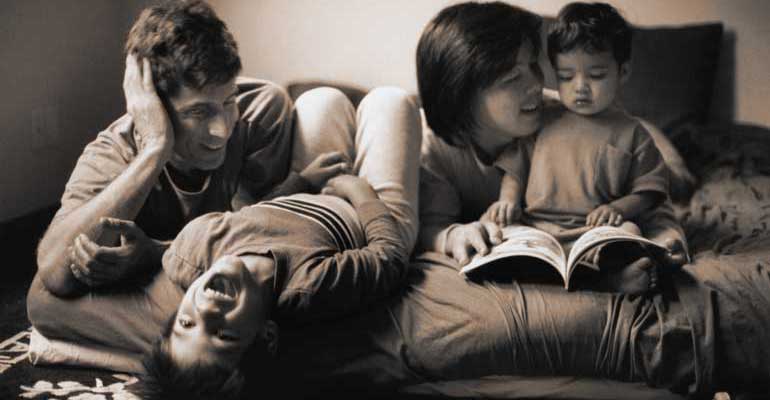By any standard, two-year-old Grace and her baby brother, Andrew, are lucky kids. They have two loving parents, one of whom has stayed home with the children since Grace was born.
They live in a comfortable home. They are surrounded by caring family and friends and belong to an active church community. They are happy and healthy.
And because their adoptive parents happen to be two men, they are helping to change the face of adoption. Jeff and Carl, their doting fathers, are among a growing number of same-sex couples who are building their families through adoption.
Booming Population
For many years gay and lesbian parents have quietly raised their children while keeping their sexual orientation private. But recently same-sex parents and gay adoption have attained greater visibility.
In November 1996, Newsweek magazine acknowledged the advent of the “gayby boom.” In the past few years, mainstream publications Parenting and Mothering ran articles profiling gay and lesbian parents, and gay columnist Dan Savage’s adoption memoir, The Kid, was a critical and commercial success. Gay parents have become a fixture in films and on sitcoms such as Friends and Will & Grace.
In 1990 an estimated 6 to 14 million children in the United States had at least one gay or lesbian parent. Many of these families have been formed by adoption. Some same-sex couples are raising children born to previous relationships, and one partner often adopts the other partner’s children.
In instances where one partner becomes the biological parent of a baby, through donor insemination or the participation of a surrogate, the other partner may complete a formal adoption of the child, known as a second-parent adoption. And many gays and lesbians adopt children domestically and internationally.
Although gay and lesbian adopters face legal, social, and emotional challenges that more traditional families do not, their goals are the same: the opportunity to love a child and build a rewarding family life.
Shared Parenting
Katharine and Suzanne have been together for six years. “We started talking about having children as soon as we got together,” says Katharine. “We took a good two years preparing and researching all the ramifications.”
Many years ago, Suzanne gave birth to the couple’s daughter, Savannah, who grew into a bright-eyed young lady. “We picked a close friend as the donor because we both know the importance of a father figure in a child’s life,” Katharine says. Four months after the birth, Katharine’s adoption of the baby was finalized.
The women share parenting responsibilities equally. Each works from home two days a week to be with their daughter; one day a week, Savannah stays with her biological father, with whom she has a close relationship. He also joins the family for dinner once or twice a month, and his extended family includes them in holiday gatherings. Says Katharine, “Savannah seems to be thriving on our special family setup.”
Family Options
The rights accorded gay parents vary from state to state. Florida, Mississippi, and Utah, for example, prohibit adoptions by same-sex couples. However, most states do not have specific statutes barring gay individuals from adopting. Nowadays same-sex parents can find adoption agencies, social workers, attorneys, and facilitators in most areas to assist them in adopting a healthy infant domestically.
Jeff and Carl have been a couple for seven years. Both come from large families and always knew they wanted children. When they began to look into adoption, they were discouraged from attempting to adopt internationally.
A friend led them to a facilitator who frequently handles single, gay, and lesbian domestic adoptions. Within a few months they adopted Grace, who is half Caucasian and half African American. A year and a half later they adopted Andrew, whose birth parents are Hispanic. Both children were considered hard to place because of their ethnicity.
Jeff and Carl have a close relationship with Grace’s birth mother. They believe she saw their status as a gay couple as a plus in the adoption. “She knew that, as outsiders, we knew what it was like to be discriminated against and would understand what the racial issues might be,” says Jeff.
Andrew’s birth mother originally didn’t have any interest in meeting the couple. “We felt funny about that because we had such a good relationship with Grace’s birth mother,” says Carl. But she softened after meeting them at Andrew’s birth.
“I had Grace in my arms, and when she saw Grace, her eyes lit up,” says Jeff. “She thought Andrew was going to be the token Hispanic in a family of white guys. But we are definitely a multicultural family.”
Building Trust
Gays and lesbians face more difficulties when seeking to adopt internationally. Some cultures are tolerant toward single, gay, and lesbian adopters, but many countries do not permit adoptions by homosexual couples or singles for religious or social reasons.
To make matters more complicated, foreign governments may change their adoption policies without warning. Gay and lesbian adopters are advised to research their options thoroughly and be straightforward with adoption agencies and facilitators before proceeding with any adoption.
“I feel it is important that there be trust between people and their agencies. People need to find an agency to confide in,” says Dr. Jane Aronson, a physician who is a pioneer in adoption medicine. After years of helping families assess the health of children adopted internationally, Aronson is now herself an adoptive parent; she returned from Vietnam last fall with her infant son, Ben. She and her partner, Diana Leo, are overjoyed to be raising a family together.
“I’m in heaven,” says Aronson. “Ben is a sweet boy and Diana and I are in love with him. When you’re a mature adult, even though you’re exhausted and gray, you can bring more to being a parent. I always had a dream of having a family, but didn’t really want to be alone,” she says. “And then I met Diana. She has a 13-year-old daughter, and she understood how important it was. I believe very much that things fell into place perfectly.”
Sources of Support
All adoptive families wrestle with the question of how much information to share with strangers and how to answer intrusive questions. Families of gay and lesbian parents also face personal questions related to the parents’ sexual orientation.
“It was amazing to me how many people asked, ‘What happens if you break up?'” says Jeff. “I finally turned to someone and said, ‘When was the last time you asked a pregnant woman what if she gets divorced?'”
Although public acceptance of adoption by same-sex couples is growing, gay and lesbian parents still face legal and social opposition in many communities and may feel isolated.It is important for them to find ways to exchange information and experiences.
Several publications and support groups are dedicated to gay and lesbian parents. The support of a caring community can also be a tremendous help. Says Aronson, “We have a lovely community of families who have adopted children, many from the orphanage Ben was in; there are also lots of kids Ben’s age in our apartment building. It’s a community of all kinds — gay, straight, single, married — and I think these children are going to be connected in a very special way.”
Katharine says, “We take the baby to church frequently, and she was baptized at a local Catholic church. We also attend another church that has a very large congregation of same-sex couples. Both churches have welcomed us with open arms, and we get our sense of community there.”
“Our families have been very supportive,” says Carl, who is Grace and Andrew’s stay-at-home caregiver, “and church has been wonderful. Last year our church started a ‘Mommy and Baby Group’ that meets once a month. I wanted to join them, but I felt odd about it until the lady who started it asked me to join. They changed the name to ‘Parent and Baby Group.'”
“Regular Families”
How children fare in gay and lesbian homes is still under study, but the majority of the current research suggests that widely held fears regarding gay parents are unfounded. A research paper published in 1995 by the American Psychological Association concluded that children of gay and lesbian parents were at no disadvantage psychologically or socially when compared with children of heterosexual parents.
In addition, the studies found no difference between children of homosexual and heterosexual parents in the proportion of children who ultimately identified themselves as homosexual. Subsequent reports in the medical literature have supported these findings; a study published in the October 1998 issue of Contemporary Pediatrics noted that a primary concern for these children is “social isolation and stigmatization,” not their family relationships.
Caitlin Phillips is a college student who was raised by her father and his partner, whom she refers to as her stepdad. She maintains a web page for children of gay, lesbian, bisexual, and transgendered (GLBT) parents. She believes that “kids of GLBT parents turn out just fine. We are no different from any other kids. The only difference is that we often have to face prejudice…. Hopefully, when more people see that gay families are regular families just like theirs, then this discrimination will lessen.”
By telling their stories, parents like Katharine and Suzanne, Jeff and Carl, and Jane Aronson and Diana Leo are helping to confront and dispel prejudices. “I want to be an openly gay parent,” says Aronson. “I want my son to know that I am honest and that we as a family are honest. I do feel it is important for gay and lesbian families to be able to create a family like anyone else.”
Names changed by request to protect the family’s privacy.



